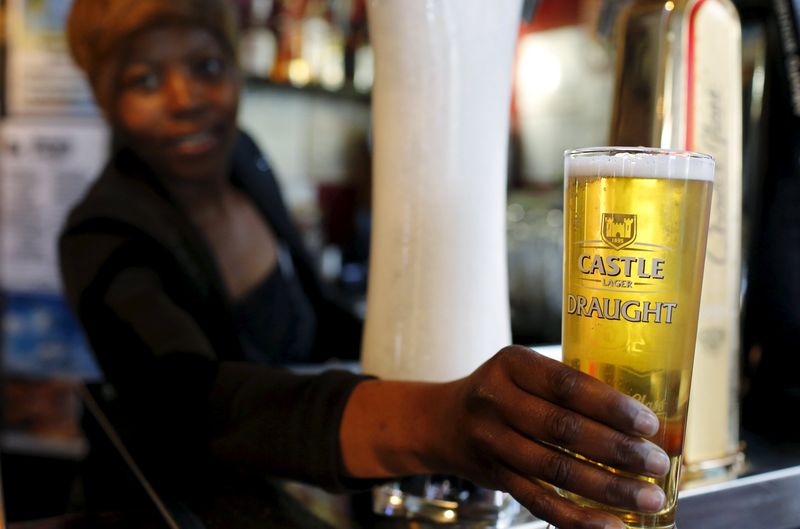By Philip Blenkinsop and Martinne Geller
BRUSSELS/LONDON (Reuters) - A $70 billion (£46.26 billion) debt package being arranged to fund Anheuser-Busch InBev's (BR:ABI) takeover of SABMiller (L:SAB) still leaves the world's largest brewer with a tricky balancing act in satisfying a range of shareholder camps with different needs.
SABMiller's two major shareholders face potential capital gains taxes, so may want to get paid in shares - which would conflict with AB InBev's controlling shareholders' desire to limit the dilution to their control that would come with issuing new shares.
Furthermore, some shareholders might have geographical restrictions tied to the location of the share listing.
Marlboro maker Altria (N:MO) and the Santo Domingo family of Colombia together own 42 percent of SABMiller, and are widely believed to prefer shares in an enlarged company rather than cash, to avoid triggering capital gains taxes on the proceeds of their stakes, worth about $24 billion and $13 billion, respectively, at current prices.
"We can say with confidence that Santo Domingo and Altria will want a decent chunk of equity, probably the majority," said Exane BNP Paribas (PARIS:BNPP) analyst Eamonn Ferry. "The wild card is how much of the free float would want equity too," he added, referring to shareholders beyond the major two.
AB InBev, maker of Budweiser, Stella Artois and Corona, is expected to have offered between 40 and 45 pounds per share for its nearest rival within the next two weeks. It is already asking banks to underwrite up to $70 billion in debt financing, sources have told Reuters.
With a deal therefore costing as much as $110 billion, that leaves a likely share issue of as much as $40 billion, a ratio that roughly fits the 60/40 split expected by analysts, who note the Brazilian and Belgian founding families of AB InBev, who own 52 percent of its shares, would not want to largely dilute their control by issuing too much new equity.
"It is hard to over-estimate the importance that ABI assigns to this ownership structure," said Nomura analysts earlier this month. "This drives an ownership culture and a long-term view."
SABMiller said on Sept. 16 that AB InBev had approached it about a friendly takeover that would form a combined group brewing a third of the world's beer. UK takeover rules require AB InBev to make a formal offer by Oct. 14, though the parties are not required to disclose the offer.
Despite the combination having been discussed for years, sources say one of the difficulties in pulling it off is finding a structure that ensures the two biggest shareholders get shares and the rest cash, while still offering the same to all shareholders.
"That's the problem," said an industry banker not involved in the deal.
SABMiller and AB InBev declined to comment. Officials representing Altria and the Santo Domingo family could not immediately be reached.
FOUNDING FAMILIES
One way to ease dilution of control is to bring the Santo Domingo family into the core group of controlling insiders, say analysts. That would makes sense given the family are founders of a Colombian brewer that SABMiller bought in 2005, and the controlling group includes the founding families of AB InBev.
"The Santo Domingos clearly know the beer business quite well. They'd be more than happy to have money invested in ABI and the 3G guys," said Exane's Ferry, referring to private equity firm 3G Capital, which is run by some of AB InBev's controlling shareholders.
3G gained control of U.S. food group Kraft Heinz (O:KHC) following deals financed in part by billionaire Warren Buffett. Members of the Santo Domingo family have invested with 3G, according to the Wall Street Journal.
Depending on price, AB InBev's core shareholder group could see their ownership of the merged group fall from 52 percent to just over 40 percent with that level of new equity. If Santo Domingo's shares were added to the core group, it could rise back to nearly 50 percent, according to some analysts.
Equity financing would mean a far higher new share component than when InBev bought Anheuser-Busch for $52 billion in 2008. A rights issue of just 6.4 billion euros meant AB InBev's net debt to EBITDA (core profit) ratio soared to more than five times.
In an SAB deal, analysts see that multiple being just over four, after likely required disposals in the United States and China.
Furthermore, there is a group of South African shareholders, three of which own 5 percent of the company, who have long ties with the South African-born brewer and might like to participate in its future growth.
But their future ownership could hinge on a continued stock listing in Johannesburg.
If the dilution is too great, Societe Generale (PARIS:SOGN) analyst Andrew Holland suggests a "backstop" share buyback at a later stage.

"The disadvantage is that the buyback would have to be done as a tender offer, which would probably have to be at a premium to whatever ABI's shares trade on at the time," he said.